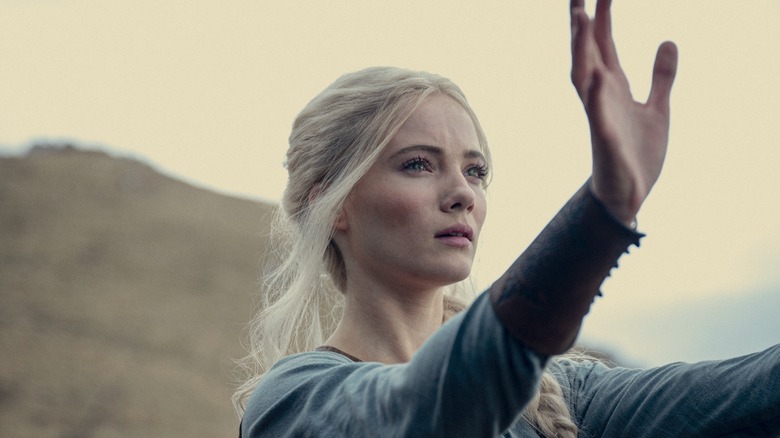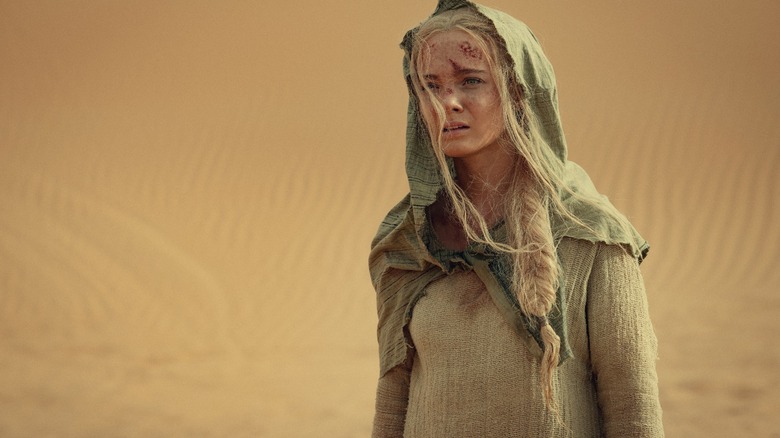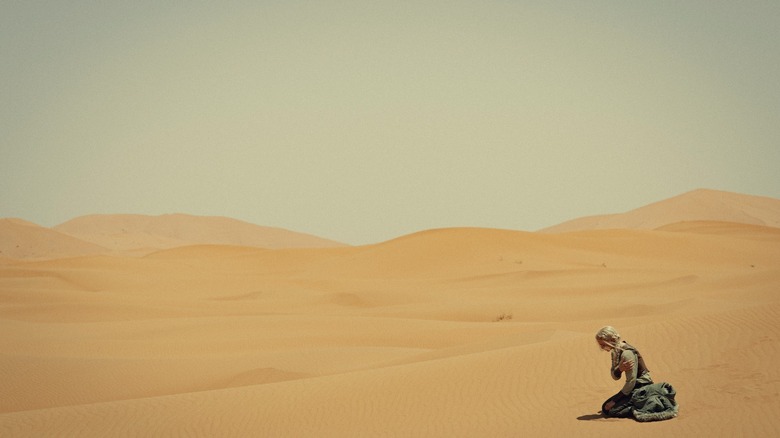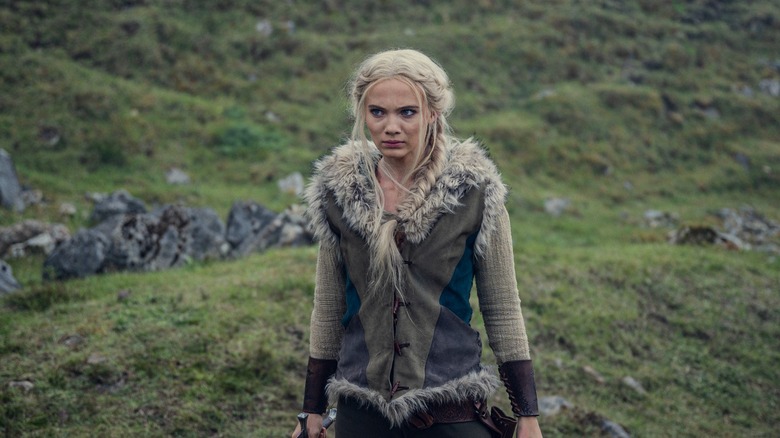The Witcher 3 Adapts Ciri's Korath Desert Arc, But What Does It Mean For Her Character?
This post contains spoilers for Netflix's "The Witcher" and the source material.
Volume II of "The Witcher" picks up right after the Thanedd Ball, and dives straight into the coup organized within Aretuza, pitting the mages against the Scoia'tael in a heated, aggressive battle. Numerous lives are lost, allegiances are questioned, and Yennefer (Anya Chalotra) has to make the difficult decision of leaving Ciri (Freya Allan) alone with Geralt (Henry Cavill) to go help her own people. While all of this is going down, Ciri gets separated from Geralt again and makes her way to Tor Lara, the fortified peak that towers over the island. This is where things get a little confusing, as we see Ciri face off with Vilgefortz (Mahesh Jadu) for a split second and yeeted to an unfamiliar desert, where she slowly loses her sanity over the next two episodes.
Fans of Andrzej Sapkowski's "The Witcher" novel series will be aware that this particular juncture in "Time of Contempt" is a massive turning point for Ciri, as it sets her on a path of self-discovery that's both dangerous and liberating. Separated from everyone she loves, Ciri is truly on her own now, forced to navigate a vicious, uninhabitable terrain that erodes both her body and mind. While the show adapts the basic beats of this arc, it does not quite explain why it's crucial for Ciri, as it omits key details that are integral to understanding these events. With so much happening at once, and the action cutting back and forth between Thanedd and the desert, it is natural to feel a little overwhelmed about the purpose of this trippy fever dream that shakes the very foundation of Ciri's worldview.
Here's everything you need to know and understand about Ciri's Korath desert arc.
Stranded in hell
The Thanedd coup was a turning point in the history of the Continent, as it exposed Nilgaardian supporters in hordes and led to the dissolution of the Brotherhood. Aside from this massive shift in power, another important event changed the lives of those involved with the prophecy of the Elder Blood: Ciri suddenly went missing, after being seen last near Tor Lara, which was struck by lightning during the coup. What the series fails to explain is that Tor Lara contained an unstable doorway known as Benavent's portal, built by the Aen Seidhe elves. The mages were aware of this unstable gateway and banned any sort of forbidden magic in the tower, but when Ciri unleashed a shockwave of power in episode 6, the portal got activated and transported her to the Korath desert. The fallout also affected Vilgefortz, as it scarred and disfigured one side of his face completely.
To provide some context about Korath, let us try and understand what this space was like, as described by Sapkowski in "Time of Contempt." Also known as the Frying Pan due to its sweltering heat and humidity, Korath was nestled between the Nilgaardian empire and the states of Zerrikania and Hakland. Due to a dearth of natural water or oases of any kind, this desert was considered a hostile place, as it also housed monsters that hibernated deep within the sand (think "Dune," but with a less cool version of the sandworms on Arrakis). Ciri suffered massively due to these natural conditions, experiencing dehydration and heatstroke within the first few hours. As the terrain also looks deceptively similar, she ended up walking in circles and collapsing during the night due to exhaustion.
Ciri wakes up to witness something magical: a lone unicorn standing majestically in the desert.
The desert trials begin
Ciri initially tries to befriend the unicorn, but it runs away, scared. After some time, the unicorn returns to guide her, and the two strike a friendship, with Ciri calling the creature "Little Horse." This is right around the time Ciri experiences vivid hallucinations — ghosts from her past that mock her for being weak and useless, and she screams in agony, feeling extremely hurt and abandoned. Little Horse is Ciri's only source of solace at this point, and the creature even guides her to a freshwater source in the desert in an attempt to help her.
However, after Ciri chomps on a desert lizard out of desperation, the poison in the reptile triggers her hallucinations again, and they haunt her night and day. In between these cruel visions, Ciri experiences yet another strange sight: Falka (Hiftu Quasem), a princess with a bloody, dangerous legacy, talks to her and urges her to unleash her true abilities without holding back.
While Falka was briefly mentioned in season 1, a brief refresher might help jog our collective memories. A royal princess who was part-elf, Falka felt wronged all her life and decided to take back what she felt was rightfully hers by starting a bloody rebellion. In the present, Falka instilled fear and disgust in the hearts of many, as she had brutally murdered her own kin for her own agenda. While Ciri is initially wary of her, Falka pushes Ciri's buttons by reminding her that her family had killed elves in the name of peace, urging her to reject her family legacy and join in her footsteps. After Little Horse is injured in a scuffle with a sand monster, Falka tells Ciri that she can cure the creature by tapping into forbidden fire magic. And she does.
A new Ciri
After Ciri taps into fire magic, she feels strangely powerful — almost too powerful for her own good. This enhanced state induces painful visions, where she sees Geralt and Yen tortured and killed. Disgusted, she relinquishes all her magic, choosing to be powerless rather than bring suffering to those she loves. After Ciri passes out, she is captured by a group who intend to sell her for a bounty, but she is rescued by the Rats, a group of rag-tag bandits. This directly leads to Ciri's bandit arc, where she, as one of the Rats, gets addicted to the thrill of murder and chooses to forego any gentleness inherent within her. With no one to guide her, Ciri chooses a bloody, morally-bankrupt path, nurturing Falka's rage within her when she tells the Rats that she now goes by that name.
Falka's presence in Korath could be real or imaginary, as it is unclear whether Ciri actually spoke to her spirit or imagined her when she was on the verge of losing her mind. Either way, Falka is a reminder of the wrath that nestles inside anyone with unimaginable power, and Ciri chooses to finally give in to this brutal side. This is not a sudden change in character, as the books always hinted that Ciri was prone to such extremes, evidenced in a conversation with Geralt in "Blood of Elves."
In this scene, Geralt argues that a witcher's sword is a heavy burden, as it is an instrument that ushers pain and death, but Ciri states that it is an instrument of freedom and empowerment, which allows her to choose brutality to ensure survival. Given Ciri's traumatic past, this perspective makes sense, as she does not want to feel helpless after a life of suffering anymore.



